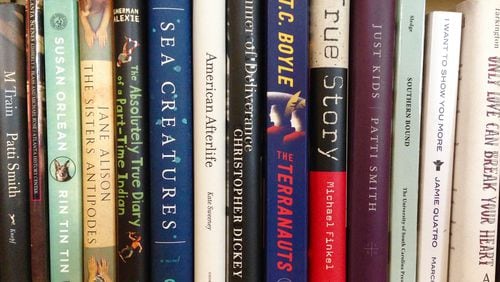Early on in Phillip Lewis’ debut novel, “The Barrowfields,” teenager Henry Aster attempts to halt a book burning of William Faulkner’s “As I Lay Dying,” in Old Buckram, North Carolina, “an achromatic town high in the belly of the Appalachian Mountains.” He drags along his father, a revered small-town lawyer and avid reader, with the hopes that the town folk will listen to reason from a man they respect.
Henry has an ulterior motive, though. He’s counting on their intervention to revive his father from the deeply depressive state he’s assumed since Henry’s grandmother’s death. The man who once represented clients who could never afford to pay for their services, who penned novels late into the night, had morphed into a mere shell of the father Henry once knew.
“[My father’s] indifference went through me like a spear … His mind was elsewhere. It was, as usual, not with me. I wondered how he had focused his attention long enough to tie his own shoes; to put on and fasten his pants and belt.”
The book burning serves as a turning point for Henry, too. The boy who once spent all of his free time reading, playing the piano, and exploring the woods near his home must now help take care of his father, his mother and his two much younger sisters, particularly Threnody, who he reads to every night. Henry’s love for her is portrayed tenderly and sensitively. “She was innocent like children are, and full of wonder. In the winter, she was an observant downy bird on a frozen branch waiting eagerly for spring. In the spring, she was an early flower straining skyward beneath a cold and hopeful sun.”
A native of North Carolina, Lewis’ descriptions of the rural mountain landscape are divine. And he paints a haunting portrait of the Aster family’s old dilapidated home, rumored to be the scene of a horrific crime. “From morning to night, it was cloaked in a slowly swirling mist as thick as smoke from a fire. At night, it brooded in darkness like an ember-eyed bird of prey on the edge of the mountains.”
One of the major themes in “The Barrowfields,” is how grief from family tragedies burrows itself in one’s soul. Henry finds himself contemplating whether the heartache from loved ones lost can ever heal. “As I sat waiting for the sun to rise and prove to me that another day would in fact arrive, I felt a lonely sense of unpassing time that one can sometimes find in the mountains of Old Buckram. This gave me an intimation of the peacefulness I hoped one day I might find.”
“The Barrowfields” falters once Henry abandons the northwest corner of North Carolina for college in Connecticut. The mountain range that grounded and informed his youth ejects him into a world of perpetual aimlessness. The perceptive and compassionate Henry we’ve come to love in Old Buckram becomes stiff and aloof outside of Appalachia. He lacks ambition, motivation or agency. He’s a character with little forward momentum.
Henry eventually follows in his father’s footsteps, enrolls in law school in Chapel Hill, North Carolina, and falls for a classmate named Story. Their relationship develops at a snail’s pace with an abundance of unfinished conversations and empty gazes, like two middle school kids at their first dance. We’re left to wonder if Henry is drawn to her simply because of her name, which, in a way that feels contrived, alludes to his love of literature. Their budding romance initiates a subplot that’s extraneous and ill-suited for “The Barrowfields.” As Henry becomes entangled in Story’s complicated past, we long for the days of yesteryear, for Old Buckram, and the novel’s centering on the Aster family and Appalachia.
In the final pages of the novel, Henry, our trusted narrator, confesses that the central mystery underlying “The Barrowfields” was never a mystery at all. Rather, he, his family, and the community of Old Buckram were simply keeping a particular incident — one crucial to the novel’s narrative arc — a secret from the reader all along.
It’s an abrupt ending, one made more frustrating by the fact that there’s no foreshadowing of it earlier in the novel. As a result, what Lewis intends to be an epiphany or surprise plot twist feels much more like a deception. One wonders whether the purpose of the novel’s already uneven plot was simply to mislead the reader.
Lewis’ prose, though sublime, can’t completely redeem this misstep. But he is a talented writer, and if “The Barrowfields,” marks the beginning of his career in fiction, one can only look forward to what’s to come.
FICTION
‘The Barrowfields’
By Phillip Lewis
Hogarth
368 pages, $26
About the Author






